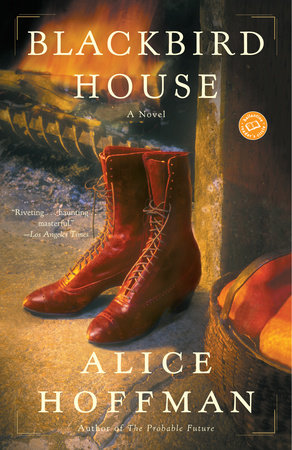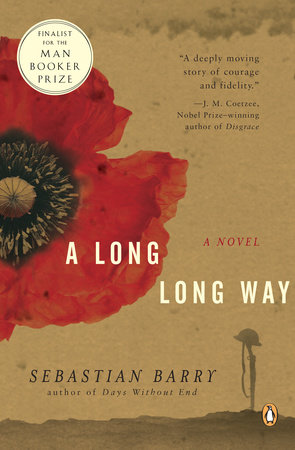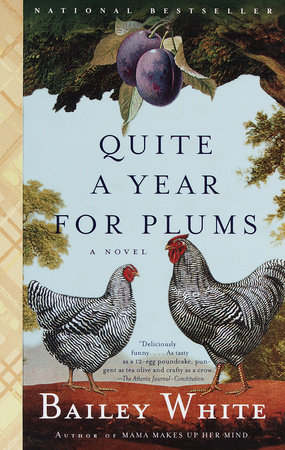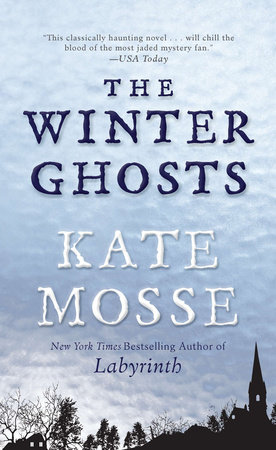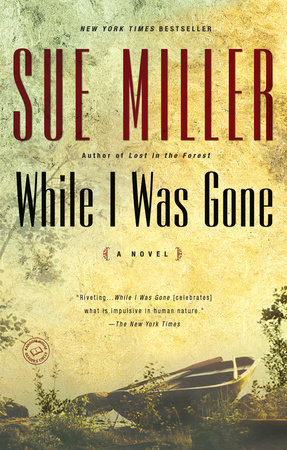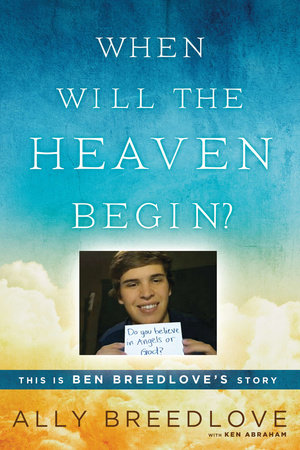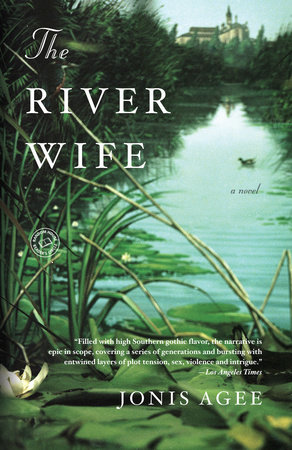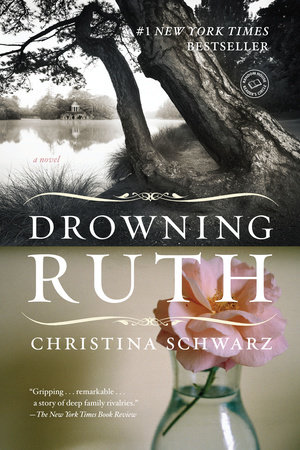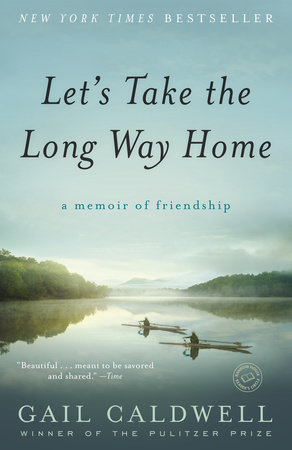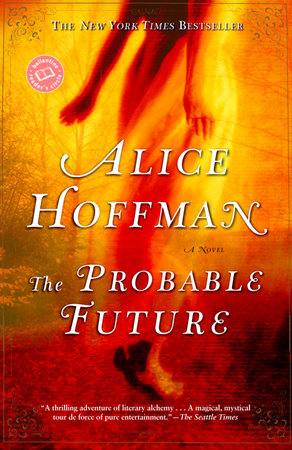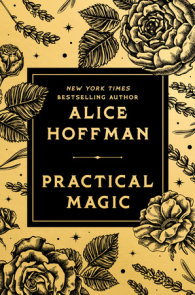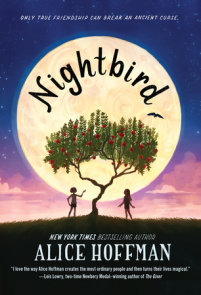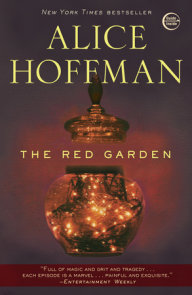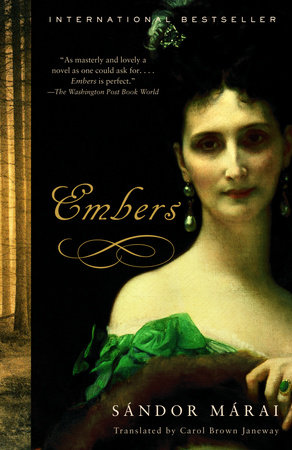Author Q&A
A Conversation with Alice Hoffman
Jennifer Morgan Gray is a writer and editor who lives in New York City.
Jennifer Morgan Gray: The title The Probable Future has many possible meanings. What did you hope to convey about the permanence—and changeability—of destiny by choosing this title? Were there any others you considered and then discarded during the writing process?
Alice Hoffman: Finding the right title is much like being givena gift. The title arrived during the writing of the novel. I realized in the process that “seeing the future” is impossible. There are thousands of possible futures all dependent on
choice and circumstance.
JMG: Did you begin the novel with a particular image, situation, or idea in mind? Or was there one character in particular that sparked your imagination for this book?
AH: The novel began with the image of a young girl who awakes on her thirteenth birthday with a “gift”—the ability to see the way some people will die. The impact of such a gift interested me. I wrote the novel after a period in which I lost many people I loved, including my mother, and I was trying to make some sense out of how unpredictable life and death are.
JMG: I was struck by the significance of names in the book, including Stella, Sparrow, and Unity, to name just a few. Did you write the book with these names already in place, or did you choose them later as the story unfolded?
AH: Names most often come with the character for me. If I ever have to change a name for any reason (repetition, another character in another book with the same name) I’m completely thrown—it’s almost as if characters are “born” with their names.
JMG: The town of Unity is as vivid a character as any of the people in the story. Did you base Unity on an actual town, or was it in some ways an amalgam of what a small New England town should be? In which ways is it idyllic? What flaws does it possess?
AH: The town of Unity was named in much the same way as the characters—it arrived along with the place—and of course it is ironic, as the town is torn in two. There is an official history and an unofficial history. One excludes the contributions
of women, such as the Sparrows. That’s the history I’m interested in.
JMG: Many of your novels are rooted in the tradition of magic. In writing The Probable Future, how did you manage to blur the lines between fantasy and reality but still make the plot events seem plausible? How do you trust your readers to
make that leap and still identify with—and relate to—your characters?
AH: I feel that the tradition of literature, of storytelling, is rooted in magic. Realism seems to me a newer, less interesting tradition. I grew up reading fairy tales, science fiction, fantasy. As far as making the leap to belief, as soon as a reader opens a
book he or she must suspend belief—marks on paper become a real world. The next leap, to identify and relate with fantastical occurrences, seems easy to me. The sort of magic I write about is that which is rooted in the real world—the probable and the possible.
JMG: Stella veers from being a recalcitrant thirteen-year-old to a young woman who is wise far beyond her years. How did you strike that balance in evoking her personality, and how did writing her character pose a challenge? Why do you think that many people in Unity are drawn to her, despite her troubled past and notorious family history?
AH: I’ve always felt that adolescence is what makes the person. That time is the most intense, the most difficult, the most amazing time in a person’s life. In the beginning of the novel Stella is a child; by the end we can see the woman she will
become. I think we are drawn to her because she’s true to herself, she’s fearless in an emotional sense.
JMG: This story is told from many points of view. What made you decide to employ this method? Who do you feel is the most reliable narrator of the story? Is there one person who you feel forms the “heart” of The Probable Future?
AH: I’m not sure the writer chooses the story. I think it’s more that the story chooses the writer. I think the heart of The Probable Future comes in thirteen parts—all of the Sparrow women. Because the novel is the story of a town, there are many points of view, all of which flow together into one history.
JMG: It has “additions added on like frosting,” you write of Cake House. This statement also could be a description of the multilayered aspects of the novel. Did you envision Cake House as a physical embodiment of the novel’s shape while
you were writing? How does the house function as a symbol— both good and bad—to the Sparrow women and to the inhabitants of Unity?
AH: I think Cake House is symbolic of history and the way history is told. Story upon story, fact upon fact. The novel is an “anti-history,” if you will, taking history apart and examining the pieces that make up the town of Unity’s past.
JMG: A theme that threads through the book is the strong links of family—and how those bonds can be created by more than blood ties alone. Was there one relationship that you found the most compelling to create? Which was the most
frustrating to write?
AH: Because I began the book soon after my mother died, I was thinking about the complicated and amazing relationship between mother and daughter. It seemed to me that motherdaughter relationships are in constant motion—the way you feel about your mother at sixteen can be radically different from the way you feel about
her at sixty. I was always interested in the importance of grandmothers
and how they enrich one’s life. I was extremely close with my grandmother Lillie. She was the intermediary between me and my mother for many years, and I think girls often feel close to their grandmothers in a way they can’t in a mother-daughter relationship. There’s a freedom, an easing up, a friendship. Those of us who have or had such relationships with a grandmother know how lucky we
are.
JMG: In interviews, you’ve said that your own experiences with illness affected your rendering of Elinor and her battle with cancer. How did your own experience shape her character? How does Elinor learn to live with illness? In which ways does being sick open her mind and her heart, especially in her relationships with her family and with Brock Stewart?
AH: I feel that illness can define you. In illness one has the opportunity to try to spend the rest of one’s life as the person he or she wants to become. Sometimes, of course, this isn’t possible—pain, circumstance, violence can be forced upon someone. But sometimes it is possible to let your illness lead you to an understanding of the world you didn’t have, and couldn’t have, before your illness. I think my experiences with those I loved in times of dire illness and dying, although filled with sorrow and pain, have been the experiences that have taught me the most about what it means to be human. As for my own illness, as a breast cancer survivor I have met amazing women, those who survived and those who didn’t, who have enriched my life in ways I could not have imagined. I’m in awe of these women, including many of my readers whom I’ve met when on book tours. The character of Elinor revealed her illness to me during my writing of the book, and I think she saw her dying as a chance to right some of the wrongs in her life, to throw off pride and ego, and get to the heart of her life: those she loved. Her family and friends.
JMG: This book is steeped in history, especially that of Unity itself. Did the story of the town come first, or did the tales of the present-day characters? Along the same lines, how did you create the history of the thirteen generations of Sparrow
women, and that of Rebecca Sparrow in particular? Did you extensively research the era of the Salem witch trials in order to effectively convey her story?
AH: Stella Sparrow came to me first, in the here and now. But no character comes unencumbered by a personal history— just as no person does. The ghosts we carry with us, the ideas and experience of our ancestors, reverberate in the present. The theme of witches and witchcraft for me often has more to do with women’s history than with spells and magic. That women have drawn strength from controlling health—medical issues, birth issues—has also made them threatening. The same is true for “witches”—strong women in touch with the natural world. Women who can’t be controlled are often viewed as dangerous. I always find it amusing to see, even still, how many little girls dress up as witches on Halloween. There’s a pull to “our” history: brave, mysterious, powerful.
JMG: Each of the Sparrow women becomes embroiled in a romance of sorts that she wouldn’t normally have considered. How do the men who surround Elinor, Jenny, and Stella—including Will, Matt, Brock, Jimmy, and Hap—act as foils to
them? How do they complement them? How does the women’s choice of men affect their evolution as characters? Or do you think that they really have a choice in the matter?
AH: I thought of The Probable Future as my own version of A Midsummer Night’s Dream—everyone is with the “wrong” person, who at first seemed “right.” The mystery of love, who you fall in love with, and why, is endlessly fascinating. I think behind all these pairings in The Probable Future is the sense that love is not only blind, it’s dumb! The choices you make can be based on what you“think” you should want, who you “think” you should be. That’s what some of the characters in the novel discover, thankfully, before it’s too late.
JMG: At the end of the novel, Jenny and Stella are grappling with death, yet they seem both truly alive and in tune with each other. Did you picture this hopeful conclusion from the outset? How do you envision their continued development,
both in relation to the outside world and to one another?
AH:When I begin a novel I don’t predict a conclusion. That isthe fun of fiction for me—the journey of discovering who the characters are and how their lives will turn out. They often surprise me and start to make their own decisions. That’s how I know the writing is going well. But I do think that by the end of the novel Stella and her mother, Jenny, are amazed to find that they can view each other as “people,” not just as extensions of one another as “mother” or “daughter” but as complex and fascinating women.
JMG: Is there a particular subject or topic that’s currently piquing your interest and imagination? What can readers look forward to reading next from you?
AH: I’ve just finished Blackbird House, interrelated fictions that all take place in the same house at the edge of Cape Cod from the late 1700s until the present. I have a little farm out on the Cape, which people said was haunted. In fact it stood empty and abandoned for several years, perhaps because of this. In my fiction, houses are often characters—they matter, they define the action and the people who live inside them. I realized that houses are indeed haunted—by their own pasts, by the lives that have been led in the same rooms you now live in, by the stories left behind. So I invented a history for my house. It was great fun for me to write and, in the end,
I love and appreciate my house even more than I did before.



